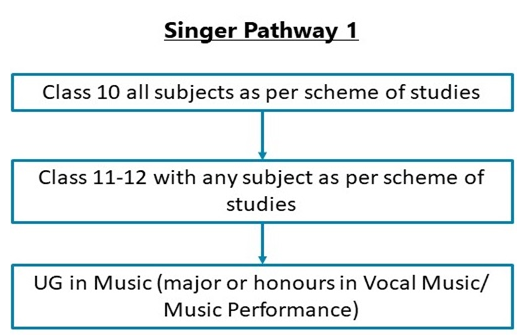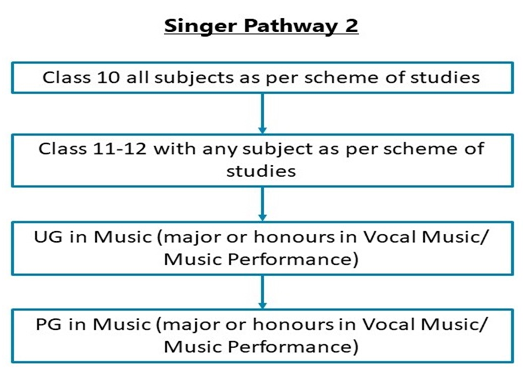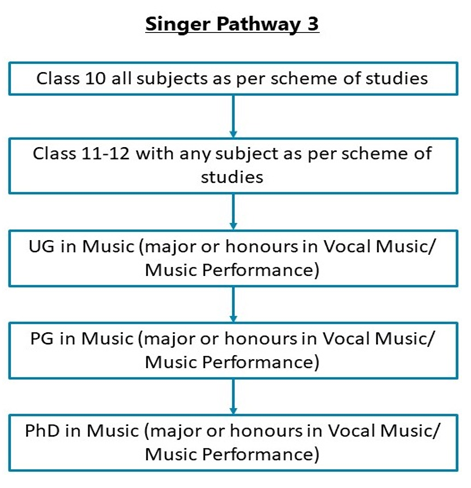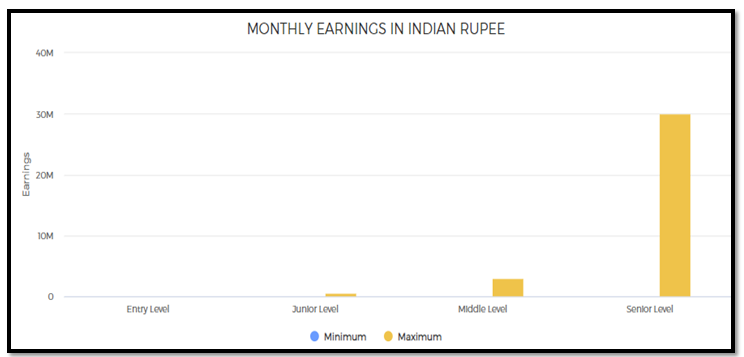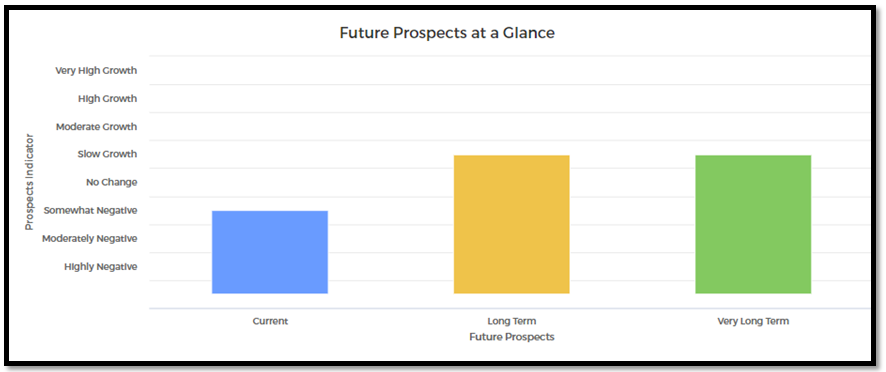Singer
Entry Level Qualification
12
Career Fields
Performing Arts
For Specially Abled






 ,
,
Career Entrance Exam
About Career
A singer is a musician, who sings the words, lyrics or composition written by someone by applying their own knowledge of sur, taal, harmony, rhythm, melody and voice production. As a singer, you will sing on stage, radio, television or motion pictures (playback singing). You can be a solo singer, vocalist of a music band, opera singer, choir member. You will perform live for audiences and perform at various venues such as recording studios.If you are a classical vocalist you perform in concert halls and auditoriums while other singers of popular music perform in clubs, parks, parties or bars. You can be a lead singer who sings the main solo vocal portions of a song composed by a music band.To become a professional singer, you need professional training and a lot of experience with music.
Key roles and responsibilities
1. As a singer, you must have the ability to perform in front of the public.
2. As a singer, you will memories the musical selections and routines and sing following the printed text, musical notes or as per instructions.
3. You memorize the songs, sometimes create a composition and provide the musical notations for the compositions written by others.
4. You may play a musical instrument yourself when you perform.
5. You seek out and learn new music that is suitable for the performance.
6. You give live or recorded performances for the TV audience, live audience, radio, movies and music videos.
7. You help the other members of a vocal group by creating vocal arrangements.
8. You negotiate the contract to hire the agents with managers and agencies.
9. You practice singing exercise and study with vocal coaches to develop your voices and skills.
10. A singer pursues with an instrumental accompanist or sometimes without an instrumental accompanist.
11. You sometimes have to travel to book music venues.
12. As a singer, you sing during a studio session until the desired recording is created.
PARTICULARS | DESCRIPTION |
Name | Singer |
Purpose | Perform Vocal Music To Entertain |
Career Field | Performing Arts |
Required Entrance Exam | No Entrance Exam |
Average Salary | 50000 - 100000 Rs. Per Year |
Companies For You | T-series, HMV, saregama & Many More |
Who is Eligible | Any One |
Career Entry Pathway
Class 10 all subjects as per scheme of studies – Class 11-12 with any subject as per scheme of studies – UG in Music (major or honours in Vocal Music/ Music Performance)
After completing Class 10 all subjects as per scheme of studies, then Class 11-12 with any subject as per scheme of studies and then study for an undergraduate degree in Music (major or honours in Vocal Music/ Music Performance). Major genres of music that you can study are Hindustani music, Western Music, Classical Music, etc. Along with the course, you would be required to have a good practice of a few years to hone your skills
Class 10 all subjects as per scheme of studies – Class 11-12 with any subject as per scheme of studies – UG in Music (major or honours in Vocal Music/ Music Performance) – PG in Music (major or honours in Vocal Music/ Music Performance)
After completing Class 10 all subjects as per scheme of studies, then Class 11-12 with any subject as per scheme of studies and then study for an undergraduate degree in Music (major or honours in Vocal Music/ Music Performance). Now you can go for a postgraduate degree in Music (major or honours in Vocal Music/ Music Performance). You can choose the genre of music from Hindustani / Karnatak / Western/ Bollywood, etc. Along with the course, you would be required to have a good practice of a few years to hone your skills
Class 10 all subjects as per scheme of studies – Class 11-12 with any subject as per scheme of studies – UG in Music (major or honours in Vocal Music/ Music Performance) – PG in Music (major or honours in Vocal Music/ Music Performance)– PhD in Music (major or honours in Vocal Music/ Music Performance)
After completing Class 10 all subjects as per scheme of studies, then Class 11-12 with any subject as per scheme of studies and then study for an undergraduate degree in Music (major or honours in Vocal Music/ Music Performance). Now you can go for a postgraduate degree in Music (major or honours in Vocal Music/ Music Performance). You can choose a genre of music like Hindustani / Karnatak / Western. After your Master’s degree, you can take a PhD course in Music (major or honours in Vocal Music/ Music Performance). Along with the course, you would be required to have a good practice of a few years to hone your skills.
Required Qualification & Competencies
To become a singer, it’s better to start learning classical music from an early age. There is no hindrance if you want to start later but to develop your voice, learning classical is a safe bet. It’s not as if there is no reputed singer who hasn’t succeeded in spite of not learning classical music, but if you want to start early, learning classical is a good beginning to prepare your voice. It gives you a choice to choose your genre later on – you can become a classical singer or a contemporary Bollywood singer or take up anything from pop and rock to hip hop and jazz.
You can learn classical music from a reputed classical vocalist who would be your Guru or you may learn from a reputed classical music school in your city. Some schools and universities offer a 5-year Diploma post your class 10 as well.
If you have been learning to sing and singing at private do’s, you can opt to do a Bachelor’s degree (Bachelor of Performing Arts or Bachelor of Music) in Vocal Music. Mostly, at this level, you have to choose among the various classical gharanas (genres) of India classical music such as Hindustani Classical and Carnatic. Then, you may do a Master’s degree (Master of Performing Arts or Master of Music) in your chosen genre.
MINIMUM EDUCATION REQUIRED | MAXIMUM EDUCATION REQUIRED |
Under Graduate | Doctoral |
Compentencies Required
Interest
1. Artistic: You should have interests for Artistic Occupations. Artistic occupations mostly involve working with creative ideas, art and designs. These occupations involve abstract or conceptual thinking, creative self-expression and often do not follow any set processes or rules for getting things done.
2. Enterprising: You should have interests for Enterprising Occupations. Enterprising occupations involve taking initiatives, initiating actions, and planning to achieve goals, often business goals. These involve gathering resources and leading people to get things done. These require decision making, risk taking and action orientation.
Abilities
1. Abstract Reasoning: The ability to understand ideas which are not expressed in words or numbers; the ability to understand concepts which are not clearly expressed verbally or otherwise.
2. Fluency of Ideas: The ability to come up with a number of ideas about a topic (the number of ideas is important, not their quality, correctness, or creativity).
3. Hearing Sensitivity: The ability to detect or tell the differences between sounds that vary in pitch and loudness.
4. Originality: The ability to come up with unusual or innovative ideas about a given topic or situation, or to develop creative ways to solve a problem.
5. Selective Attention: The ability to concentrate on a task over a long period of time without being distracted.
Knowledge
Performing Arts: Knowledge about the theories and techniques required for producing various works of performing arts such as music.
Skills
1. Active Listening: Giving full attention to what other people are saying, understanding the points being made by others, asking questions, etc.
2. Singing: Skills in singing and rendering music.
Personality
1. You are always or mostly a soft-hearted person.
2. You are always imaginative or in most situations.
3. You always prefer to experience new things and have new experiences or you mostly do.
4. You can always act independently or could do so in most situations.
5. You trust others sometimes but not always.
6. You are helpful to others sometimes.
7. You are mostly impulsive in your action and behaviour.
Career - Job Opportunities & Profiles
1. You can get job opportunities in recording studios maybe as a solo vocalist or in a choral group.
2. You can become a music teacher in a school and a professor in colleges and universities.
3. If you are a specialist in composing music, then music production companies may hire you as a music composer, music director.
4. Remember that there is no permanent job here. You are hired only for a project.
5. You can become a playback singer in the music industry (Bollywood, Tollywood, and other film industry as well).
6. Music companies like T-series, HMV, saregama etc. will provide you with the opportunity to launch the covers of songs.
7. As a singer, you can also get various opportunities in theatres, music bands etc.
8. There are various opportunities for professional singers on a temporary basis as they hire for their events and functions.
9. You can start your youtube channels and various pages on social media.
10. You can start your own band of music or work with another band.
Work environment
As a singer, you don’t have to work as a 9-5 job. Many singers and vocalists work in the film and music industry where there is no restriction on working hours. However, there will be timelines to follow. In the teaching side, most of the work environment is relaxed where you would be working for 6 hours per day and there will be relaxed and creative sessions with students.
Although, if you are recording for a studio or give a live performance then you often work at night and on weekends also as most of the performances does happen on weekends and especially in the evening.
Specialisation Tracks In This Career
Hindustani Classical Singer
A singer who is a specialist in Hindustani vocals which includes the explaining and improvisations of ragas. A classical singer belongs to a special Gharana. Gharana is a style of singing. There are so many Ghranas like Agra Gharana, Kirana Gharana, Jaipur Gharana, Patiala Gharana, Delhi Gharana, Banaras Gharana, Mewati Gharana etc. Classical singer practices for many years to hone their sills.
Carnatic Classical Singer
A Carnatic classical singer practices the music of south India including the states of India (Andhra Pradesh, Telangana, Karnataka, Kerala, and Tamil Nadu). This music also includes various forms of gayakis (singing styles).
Folk Singer
As a folk singer, you learn the various forms of music like bhangra, lavani, dandiya, Sufi folk, Rajasthani etc. which tells about India’s diverse vast cultural diversity.
Baul Singer
A singer who is a specialist in the music forms or styles belonging to the Bengal region which includes Bangladesh and the Indian states of West Bengal, Tripura and Assam’s Barak valley. As a baul singer, you will perform in a group which constitutes the religious sect and a musical tradition.
Bhajan Singer
A bhajan singer usually sings the song refers to any religion theme or spiritual idea in a regional language from the Indian subcontinent.
Singer (Rabindra Sangeet)
A singer who sings the songs written and composed by Rabindranath Tagore who have their origin from Hindustani classical music, western music, Bengali folk songs, kirtan.
Thumri/Dadra singer
As a thumri singer, you are specialized in semi-classical Indian music, this form relates to dance, dramatic gestures, poetries and folk songs of Uttar Pradesh. As a specialist in Dadra, you perform the Hindustani classical music of South Asia (India, Bangladesh and Pakistan.)
Sufi singer
A Sufi singer sings the work of Sufi poets like Rumi, Bulleh Shah, Amir khusrow, Khawaja Ghulam Farid. You can be specialized in the form of Sufi music like qawwalis, ghazals and kafi.
Bollywood Singer
A Bollywood singer sings the songs of Hindi films which are featured in Bollywood or Hindi cinema. You can be a playback singer.
Western Classical Singer
As a western classical singer, you learn the art of music which belongs to the western culture like American classical music, United Kingdom. Your singing will include chants, carols, symphonies, mass, requiems, opera etc. You practice in the tonal system, standard musical form, fixed notational system and instruments. Several forms of music that you will sing include pop music, blues, jazz, rock, rock and roll, hip hop.
Hip Hop / Rap Singer
Hip Hop or Rap music is a genre of music created and developed mostly by African Americans and Latino Americans in New York City in the late 70s. The key feature of Hip Hop of Rap music is a constant rhythm or beat which accompanies the vocals. The lyrics are mostly based on everyday issues, problems, triumphs and aspirations of the underprivileged communities. The vocals are almost chanted and often sung rapidly.
Jazz Singer
Jazz is a music genre which originated in New Orleans, the USA in the late 19th and early 20th Century. Like Hip Hop, it is also created by African-Americans. Jazz singing is now quite popular worldwide.
Western Pop/Rock Singer
Pop music is a popular music genre while rock music is a music genre with a large range of styles of renditions. Rock music was created in the USA in 1950s as part of the rock and roll genre. Later, rock music diversified widely to include various sub-genres such as classic rock, hard rock, acid rock, techno rock, alternative rock, blues rock, etc.
Ghazal Singer
Ghazal is an ancient poetic art form, originated in the 7th Century in Arab. It spread to Indian sub-continent from the 12th Century. Ghazal genre is always based on poetry and there is a strong Sufi influence. Ghazal lyrics or poetries talk about humanity, spirituality, love and other human emotions.
Career Growth
1. The career growth in university and college states from the assistant professor and then associate professor, professor and professor emeritus. Professors can also get administrative positions such as Director/Dean/Vice Chancellor etc.
2. If you are working in a band, you will be a lead singer. You may continue to work in the same band or you can start your own band.
3. If you are working in a music company as a trainee singer, then you will become a singer then a senior singer and then a lead singer.
4. In schools, you will start as a music teacher and then become head of the department. You may also move to the administration side later.
Salary Offered
1. Singing is a creative career. Your earning will depend upon your hard work, your talent, your performance and to some extent your luck. You may sing just one song and it may become viral on Youtube to bring you overnight fame. You can encash the fame and start charging Rs. 1,00,000 – 2,00,000 or even more per performance in a concert. You can earn from your own Youtube channel too. You can be rich in just 2 years.
2. Or you may struggle a lot for many years without being able to make your name established in the industry or gain fame and popularity on Youtube.
3. Getting a chance into playback singing is extremely tough but if you can make it and produce a hit song (well, whether a song will be a hit or not, will not exactly be in your own hands), you will definitely start commanding something between Rs. 1,50,000 – 3,00,000 or even more per song, depending upon your popularity. For a concert, you can charge similar fees.
4. If you are famous and popular (you may achieve this in 1 year or many be in 20 years or may be never), you can charge on an average Rs. 1,00,000 – 25,00,000 or even more for a song in a movie (the lower side in regional movies and higher in Bollywood or Tollywood) and anything between Rs. 5,00,000 – 30,00,000 or even more per concert.
5. If you are part of a music band, your fortune will be as same as above. However, in such a case, your earning will be less as money is generally divided equally among band members. A band may also hire you and pay you separately.
6. However, to earn your daily bread and butter, you can apply and get a job as a Music Teacher in a school, which will get you a decent Rs. 20,000-25,000 a month. If you have a Ph.D., then as an Assistant Professor, you can get about Rs. 60-65,000 a month.
7. Senior Music Teachers can earn about Rs. 40-45,000 a month and Professors earn about Rs. 1,80,000-2,20,000 a month.
8. You can open your own music school or offer tuition at your own home or at learner’s home. This is another way to earn your daily bread and butter while you attempt to establish yourself in the music industry. For an hour of tuition, in cities, you may get about Rs. 200-500. Growth in your income here will also depend upon your reputation.
Monthly Earnings In Indian Rupee
1. Entry level: 0 - 2 years of work experience
2. Junior Level: From 1 to 12 years of work experience
3. Mid Level: From 5 to 20+ years of work experience
4. Senior Level: From 10 to 25+ years of work experience (there could be exceptions in some high-end technical, financial, engineering, creative, management, sports, and other careers; also in the near future, people will reach these levels much faster in many careers and in some careers, these levels will have no meaning as those careers will be completely tech skill driven such as even now, there is almost no level in a Cyber Security Expert’s job)
Work Activities
1. Communicating with co-workers and others: Communicating with people in writing, verbally or otherwise inside your workplace and various other people who have professional relationships with your place of work including vendors, government officials, etc. or with people at large.
2. Creative thinking: Developing new ideas, concepts, innovative solutions to problems, newer ways of getting things done, designing products and services, creating work of art and craft, etc.
3. Performing for people: Performing various tasks for people to entertain them, help them, and assist them.
4. Rendering music: Singing, playing various musical instruments.
Future Prospects
India is one of the biggest markets for the music industry. Currently, there are over 18 million users of online music streaming in India, and there are over 4 billion monthly streaming in India. The biggest reason for the expansion of the music industry in India is the rise of the population using the internet and a further increase in data consumption. From 1 GB per month in 2017, today Indians on average consume 13 GB of internet per month. Music videos consume 58% of this data. With such growth, India is poised to become one of the 10 biggest music markets. In such an era of growth, the rise of online channels, YouTube popularity in India, opportunities for musicians and singers don’t end in India, and they are going to rise further in future.
India is the largest producer of movies in the world. Movies in Hindi, English, Marathi, Telugu, Tamil, Malayali, Bhojpuri and Punjabi are regularly produced. Each of these movies does have 4-5 songs. Thus, even the movie industry provides a wide opportunity for musicians and singers.
Future Prospects At a Glance


